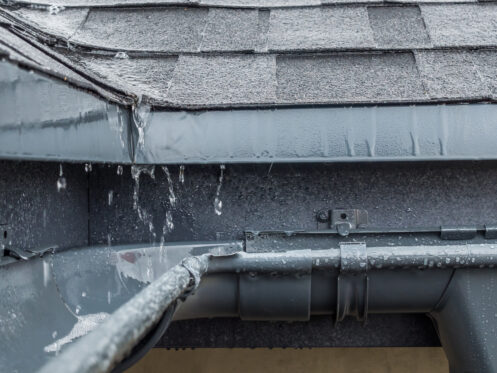When it comes to getting a new roof for your home or building, you may feel overwhelmed by your choices. One of the most important decisions you’ll have to make is the type of material you want to use. The overall pitch of your roof will be one of the biggest determining factors in determining the appropriate material.
What Is Roof Pitch?
When you take a look at the roofs of homes and buildings when you’re driving down the street, you’ll notice that there is a very large variation. Some homes will have a steep or pointy roof, while some buildings may have a flat roof. To put these differences into measurable terms, you’ll want to calculate the roof’s pitch, commonly referred to as its slope.
Roof pitch is defined as how many inches the roof rises for every foot of depth. You’ll need to take three main measurements to determine your roof’s pitch. The first is going to be the width of your home, which runs from one end gable to the other on the average home. For example, purposes, let’s say this is 20 feet. You’ll also need to determine the overall rise of your roof, which can be done by measuring the difference between the peak of your roof and its height at the level of its gable end.
Let’s say that the overall rise of your roof is 15 feet. This would give your roof a pitch of 15/12, making it a very steep roof. Roofs can come with all different types of pitches depending on their construction. Some of the most common that you’ll come across are 4/12, 6/12, and 8/12. For the most accurate measurements, a roofing professional can measure the pitch of your roof.
How Slope Affects Material Durability
The overall slope of your roof will determine the specific durability needs of your roofing material. Roofswithe a very low pitch will need a material that can withstand pooling water and is very flexible. Conversely, a building with a very high-pitched roof will need to be highly resistant to heavy rain and wind. If you choose the wrong roofing material for the pitch of your roof, it will prematurely fail and likely lead to water leakage inside your home or building.
Roofing Materials For Low-Pitched Roofs
Roofs with a pitch below 3/12 are considered low-pitched roofs. This type of roofing style is very popular for industrial buildings, contemporary-styled homes, and some new urban-style homes. This type of roof requires a roofing material that is UV-resistant and resistant to standing water. Some of the most popular roofing materials for low-slope roofs include built-up bitumen, torch-down, rubber membrane, and standing seam metal.
Roofing Materials For Low-to-Moderate Roof Slopes
Roofs that have a pitch between 3/12 and 19/12 are considered to be in the low to moderate range. These roofs can typically benefit from using clay or cement tile because the pitch is low enough that they won’t slide or rattle off. It’s important to note that to use these materials, you’ll need to use a double underlayment for optimal water seepage prevention. Otherwise, you can opt for any other low-pitched roofing materials already discussed.
Roofing Materials For Average-Sloped Roofs
Roofs in this category have a slope between 4/12 and 20/12. Most residential homes will fall into this roof pitch category. Asphalt shingles on this type of roof pitch are a common choice because there is enough of a slope where water will drain downward and not back underneath the shingle. Ideally, you can use three-tab or architectural shingles for slopes up to 12/12.
When you reach a slope above this, you’ll likely want to use only architectural, also known as dimensional shingles. This simply comes down to the fact that architectural shingles are lighter than three-tab shingles. As the pitch gets higher, the weight of the roofing material needs to be lighter.
Some other materials that can be used for roof slopes between 5/12 and 12/12 include wood shakes, slate, and metal. It’s important to note that both slate and wood shakes don’t interlock as tightly as shingles. This means they shouldn’t be used on lower slopes as it can allow for more water infiltration since gravity isn’t pushing as much water downward. Metal can pretty much be installed on any roof slope down to the manufacturer’s recommended minimum pitch.
A Note on Manufacturer’s Minimum Roof Pitch
Because the effectiveness of a roofing material is going to be highly dependent on the pitch of a roof, manufacturers are specific about their mandatory installation practices to ensure optimal performance. All manufacturers will set a minimum pitch requirement for any roof upon which their roofing material is installed.
If the material is installed on a roof with a pitch less than the minimum, it will automatically void the warranty coverage. For this reason, you must understand the minimum pitch for whatever roofing material you want to use on your home or building. You can find the minimum pitch on the product’s packaging or by asking your roofing professional.
Other Factors That Will Determine the Best Roofing Material
While the overall pitch of your roof will be a big factor in narrowing down the choice of materials you can effectively use, you will need to consider some other factors when determining the appropriate material for your next roofing job. One of the most important is the overall price of the material.
In general, flat or built-up roofing materials will be the least expensive, followed by asphalt shingles. The next level of pricing will be metal roofing, followed by both tile and wood shakes. Slate is generally going to be the most expensive roofing material to purchase. It is important to note that while pricing is important, you also need to consider the overall lifespan of the roofing material. It’s very common for longer-lasting roofing materials to be more expensive.
In general, most flat roofing materials like EDPM, TPO, and modified bitumen roofs have a lifespan ranging between 20 and 30 years. Asphalt shingles will last a minimum of 15 to 30 years, depending on the specific quality of the shingle that you purchase. Wood shakes have a lifespan of around 15 to 20 years or more. Tile, concrete, and metal roofing all have a lifespan of 50 years or more. Slate has an estimated lifespan of 100 years or more, making it the most durable, longest-lasting roofing material on the market today.
Expert Roof Installation Service
Fraser Roofing, LLC offers expert roof installation service for the Metro Atlanta, GA, area. We can also help with all your emergency roofing, roof repair, roof replacement, storm damage, and gutter replacement needs. You can count on us for high-quality workmanship at competitive rates. Customer satisfaction is our top priority. Call our friendly office staff today to book a consultation with our helpful roofers.

